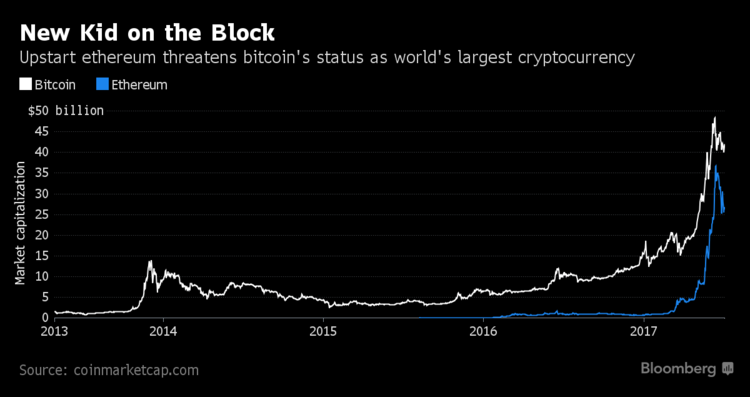“SegWit is itself a great technology, but the reason it hasn’t taken off is because its interest doesn’t align with miners,” Wu said.
Still, after previous counter-proposals championed by Wu fell through, miners last month agreed to compromise and support SegWit, in exchange for increasing the block size. Wu says the plan will alleviate short-to-medium term congestion and give Core enough time to flesh out a long-term solution. That proposal is what is known as SegWit2x, which implements SegWit and doubles the block size limit.
“You can think of the SegWit2x proposal as an olive branch,” said Wu.
Support for SegWit2x has reached levels unseen for previous solutions. About 85 percent of miners have signaled they are willing to run the software once it’s released on July 21, and some of bitcoin’s largest companies have also jumped on board.
The unprecedented level of endorsement is partly prompted by anxiety of bitcoin losing its dominant status to ethereum, a newer cryptocurrency whose popularity has soared thanks to its ability to run smart contracts and its more corporate-friendly approach.
Still, hardliners say that after more than two years of bitter arguments, a split would let people part ways to explore different visions, even if prices crash.
Bitcoin dropped for a fourth day on Tuesday, declining 1.9 percent as of 7:49 a.m. in New York, to its lowest level since June 15. The cryptocurrency is down 22 percent from a record high in early June.
Some of Core supporters are pushing a separate agenda called UASF (user activated soft fork). Starting from Aug. 1, it will reject transactions not compliant with SegWit. If a majority of miners do not adopt SegWit by then, two versions of bitcoin would come into existence, triggering a currency split.
“It’s moderates versus extremists,” said Atlanta-based Stephen Pair, chief executive officer of BitPay, one of the world’s largest bitcoin wallets. “It depends on how much a person values the majority of people staying on one chain at least for a little while longer, versus splitting and allowing each pursuing their own vision for scaling.”
But moving data off the blockchain effectively diminishes the influence of miners, the majority of whom are based in China and who have invested millions on giant server farms. Not surprisingly, Core’s proposal, called SegWit, has garnered resistance from miners, the most vocal being Wu Jihan, co-founder of the world’s largest mining organization Antpool.
Will Bitcoin Tear Itself Apart?
July 11, 2017
« Previous Article
| Next Article »
Login in order to post a comment








